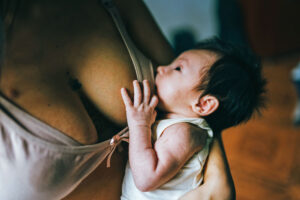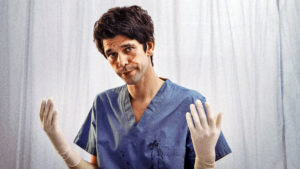The third time I went into labour, I was determined to avoid getting told off. With both of my previous births, I had somehow managed to get things wrong. My errors the first time: going to hospital too early, then, when I returned three hours later, “leaving it so late”. The second time: ignoring assurances that I didn’t need to come in yet, then giving birth in the car park — an event I later discovered was being used in antenatal classes as an example of women “not planning ahead”.
“My previous births have been fast,” I said, when I went into labour with my third, “so I’d like to come in now.” I was speaking to the woman at the midwife-led unit that is the only option where I live. (If you need a caesarean section, you have to be transferred to next town.) “Third babies are notoriously difficult,” was her response.
What an odd thing to say to a woman already in labour. The “notoriously” suggested it wasn’t based on any actual evidence, but rather a kind of folk wisdom. It felt as though I was being warned not to tempt fate, not to assume that this baby would just pop out. I saw myself being categorised as one of those arrogant women who presumes to know her own body, only to be taught a harsh yet much-deserved lesson. “Third babies are notoriously difficult” sounded not unlike “third-time mothers shouldn’t get above themselves”.
In fact, I have never been particularly cocky about childbirth. When I was pregnant with my first child, back in the days when the Right-wing press were still obsessed with famous women being “too posh to push”, I wondered if I might be able to get an elective caesarean myself. I did not particularly care about childbirth being a wonderful experience, or about “doing it well”. I didn’t care if the Daily Mail thought I was a joke.
What I cared about was not having a child who would face the same difficulties as my brother, who was starved of oxygen at birth. This has had serious consequences for him, and for the rest of my family. Just how serious is hard to gauge. He was born traumatised; there has never been a before to compare the after with. What there has been instead is the hazy outline of an alternative life, one that runs parallel to the one he has now. It’s a life that began with the problem being identified sooner, with him being delivered quickly, perhaps by emergency caesarean. The difference between this and his actual life comes down to something small: mere moments, mere breaths.
I was born three years after my brother, in a larger hospital, where my mother was induced and monitored carefully. There is something very strange about being the sibling who had the safe birth. It feels as though I stole it. There is a constant sense of guilt, as if my life — my independence, my choices — constitutes a form of gloating. “This is what you could have had.” Everything I do feels like something owed to my brother (do it, because he can’t) but also something taken from him (you shouldn’t have done that, because he should have done it first).
Still, my family were fortunate, insofar as my brother didn’t die. Current reports on the Nottingham maternity scandal reference 1,700 cases, with an estimated 201 mothers and babies who might have survived had they received better care. What strikes me, reading them, is the enormous gulf between the cost of a disastrous birth and the trivial, opportunistic way in which childbirth is so often politicised — with mothers themselves viewed as morally, if not practically, to blame if anything goes wrong.
As a feminist who concerns herself with how the female body is demonised, my interest in debates about birthing choices is more than personal. I have read books railing against the over-medicalisation of childbirth, aligning it with a patriarchal need to appropriate female reproductive power. I have also read books protesting the fetishisation of “natural” birth, suggesting that it infantilises women, that it implies women deserve pain. To be honest, I find both arguments persuasive and dismaying. Both are right about the way in which misogyny and professional arrogance can shift the focus away from meeting the needs of women and babies. I feel a kind of rage that we are told to pick a side.
Representations of the labouring woman are so often negative: the naïve idealist, the “birthzilla“, the birth-plan obsessive, the woman who is “too posh to push”. This latter stereotype has gone hand-in-hand with a veneration of vaginal births, and stigmatisation of caesareans, that has had sometimes disastrous consequences. Midwives at the centre of the Furness General Hospital scandal were reported to have “pursued natural birth ‘at any cost’”, referring to one another as “the musketeers”; at least 11 babies and one mother died. But their approach was sanctioned by their employer: the 2006 NHS document “Pathways to Success: a self-improvement toolkit” explicitly suggested that “maternity units applying best practice to the management of pregnancy, labour and birth will achieve a [caesarean section] rate consistently below 20% and will have aspirations to reduce that rate to 15%”. Proposed benefits to this included “a sense of pride in units”.
Responses to maternity scandals now express horror that such an anti-intervention culture ever arose — responses in the same press that denigrated women such as Victoria Beckham and Kate Winslet for not giving birth vaginally. Instead, newspapers now stoke outrage over “natural” treatments during NHS births, such as burning herbs. Women have been shamed for having caesareans, but they have also been shamed for wanting births with minimum intervention — as though they are selfish and spoilt for seeking control over such an extreme situation.
In his memoir This Is Going To Hurt, former doctor Adam Kay writes disparagingly of women who arrive at the delivery suite with birth plans:
“‘Having a birth plan’ always strikes me as akin to having a ‘what I want the weather to be’ plan or a ‘winning the lottery’ plan. Two centuries of obstetricians have found no way of predicting the course of a labour, but a certain denomination of floaty-dressed mother seems to think she can manage it easily.”
Wanting to have some control over your experience of labour — which will hurt you and could kill you or your baby — is not akin to some messianic aspiration to control the weather. And in his mockery of the woman who wants whale song and aromatherapy oils, ironically, Kay deploys the same silencing techniques that might intimidate a woman out of seeking the very interventions he so prizes. What he and others do not seem to grasp is that their arrogance is a problem, regardless of which course of action they champion. It makes women feel they can’t speak, for fear of inviting hostility at their most vulnerable moments. It’s true that none of us knows our body well enough to know how we will give birth. But, looking back, I find it utterly insane, not least given my own family history, that one of my biggest worries during labour was “please don’t let anyone get cross with me”. Then again, I don’t think that fear is unrelated to the desire to remain safe.
Birth is not a joke. It is not a place for professional dick-swinging or political one-upmanship. I cannot describe — and, as I am not my mother, cannot fully understand — the shame of feeling that you “let down” your child before they drew their first breath, that they will forever suffer because of it. You watch an entire life unfolding and that feeling is there, every single day. This is the fear of the women in labour who are characterised as either idiots mesmerised by fantasy homebirths or cold-hearted posh ladies who can’t take the pain. If things go wrong, they are the ones who will bear the consequences, reflecting every day on what might have been, if they’d only done more.
When people discuss their siblings, my mind does wander to the one I don’t have, the one who was born safely. Perhaps he would have a job he loved, or one he hated, but in any case a job. Perhaps he would have a partner. Perhaps he would have children, and I would be their aunt. Perhaps we wouldn’t get on, wouldn’t even speak, but he’d have a life of his own. I know he thinks about this too. I wonder if the professionals who presided over his birth have thought about him since.
My third labour was not, by the way, “notoriously difficult”. My third son arrived into the world safe and well. No one can say why him or me, and not my brother. Mothers may long for control over birth, for which we are mocked; but we do not have it, for which we are blamed. Politics still takes precedence over our needs, and the needs of our babies.
Disclaimer
Some of the posts we share are controversial and we do not necessarily agree with them in the whole extend. Sometimes we agree with the content or part of it but we do not agree with the narration or language. Nevertheless we find them somehow interesting, valuable and/or informative or we share them, because we strongly believe in freedom of speech, free press and journalism. We strongly encourage you to have a critical approach to all the content, do your own research and analysis to build your own opinion.
We would be glad to have your feedback.
Source: UnHerd Read the original article here: https://unherd.com/



